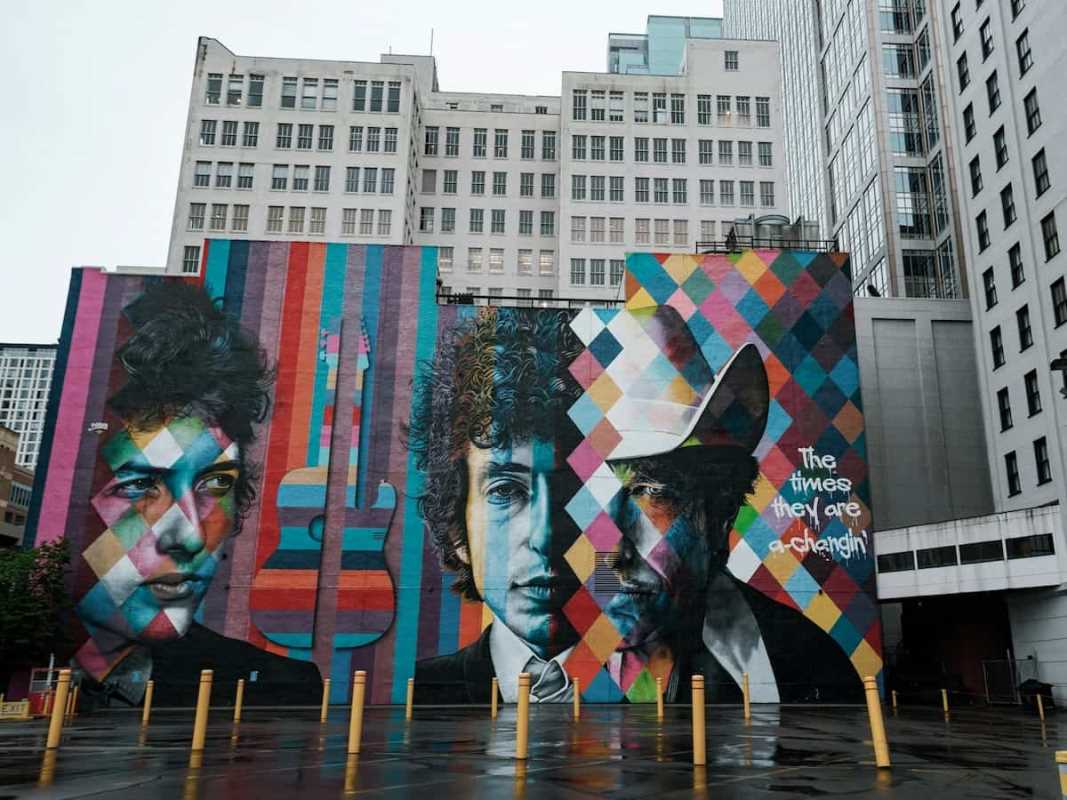When a single song can define an era, launch a career, or change the direction of popular music, it becomes more than just a melody—it becomes a cultural touchstone. From the poetic narratives of Bob Dylan to the pop perfection of Taylor Swift, certain artists and their signature songs have left an indelible mark on music history.
Bob Dylan - "Blowin' in the Wind" (1963)
Bob Dylan's prophetic voice first reached mass consciousness through this deceptively simple folk song. While "Like a Rolling Stone" may be his magnum opus, "Blowin' in the Wind" transformed Dylan from a Greenwich Village folk singer into the voice of a generation. The song's profound questions about peace, war, and humanity established Dylan as a masterful lyricist whose influence would extend far beyond folk music. Its impact was so significant that it became an anthem of the civil rights movement, demonstrating how music could be both artistically brilliant and socially transformative.
Michael Jackson - "Billie Jean" (1983)
When Michael Jackson moonwalked across the stage performing "Billie Jean" on Motown's 25th anniversary special, popular music changed forever. The song, with its instantly recognizable bassline and Jackson's vocal prowess, helped propel "Thriller" to become the best-selling album of all time. "Billie Jean" showcased Jackson's ability to merge pop, R&B, and dance music while telling a compelling story. The accompanying video broke down racial barriers on MTV and set new standards for visual presentation in music.
Madonna - "Like a Virgin" (1984)
Madonna was still a rising star when "Like a Virgin" exploded onto the music scene, transforming her from a promising newcomer into a global superstar. The song's provocative lyrics and Madonna's boundary-pushing performance style—exemplified by her legendary MTV Video Music Awards performance in a wedding dress—created a template for how artists could merge sexuality, fashion, and pop music. This breakthrough hit set the stage for her reign as the "Queen of Pop" and influenced generations of female artists who would follow her lead in taking control of their image and artistry.
Kurt Cobain/Nirvana - "Smells Like Teen Spirit" (1991)
When the opening riff of "Smells Like Teen Spirit" first crashed through radio speakers, it announced not just the arrival of Nirvana but the mainstream emergence of grunge and alternative rock. Kurt Cobain's raw vocals and cryptic lyrics captured teenage angst and disillusionment perfectly, while the song's quiet-loud dynamic became a blueprint for alternative rock. This track single-handedly brought underground rock to the mainstream and made Cobain the reluctant voice of Generation X.
Lana Del Rey - "Video Games" (2011)
With its haunting melody and cinematic atmosphere, "Video Games" introduced the world to Lana Del Rey's unique artistic vision. The homemade-style video went viral, establishing Del Rey as a new kind of pop star who merged vintage Americana aesthetics with modern pop sensibilities. The song's dreamy, melancholic tone influenced a whole generation of alternative pop artists and helped establish the "sadcore" genre that would dominate much of 2010s alternative music.
Taylor Swift - "Love Story" (2008)
While Swift has many career-defining hits, "Love Story" marked her transformation from country prodigy to global superstar. This modern retelling of Romeo and Juliet showcased Swift's storytelling abilities and pop sensibilities, setting the stage for her eventual complete crossover to pop music. The song demonstrated her ability to connect with listeners through detailed narrative songwriting, a skill that would become her trademark throughout her career.
David Bowie - "Space Oddity" (1969)
Released just days before the Apollo 11 moon landing, "Space Oddity" captured the space-age zeitgeist while establishing Bowie's talent for character-driven narratives. The song introduced Major Tom, the first of Bowie's many personas, and demonstrated his ability to merge artistic innovation with commercial appeal. Its unique structure and storytelling approach proved that pop music could be both experimental and accessible.
Prince - "Purple Rain" (1984)
The title track from Prince's breakthrough film and album combined rock, gospel, and R&B in a way that only he could achieve. "Purple Rain" showcased Prince's guitar virtuosity, vocal range, and emotional depth, becoming his signature song despite its unusual length and structure. The track exemplified his ability to transcend genre boundaries and create something entirely unique.
Whitney Houston - "I Will Always Love You" (1992)
Though originally written and recorded by Dolly Parton, Whitney Houston's powerful rendition became one of the best-selling singles of all time. The a cappella opening and Houston's soaring vocals demonstrated her unparalleled voice and helped establish her as one of the greatest singers in popular music history. The song became Houston's signature piece and set new standards for vocal performance in pop music.
Freddie Mercury/Queen - "Bohemian Rhapsody" (1975)
Perhaps no song better exemplifies artistic ambition in pop music than "Bohemian Rhapsody." Freddie Mercury's operatic masterpiece broke all the rules of conventional songwriting, combining rock, opera, and ballad styles in an epic six-minute suite. The song's success proved that audiences were ready for complex, ambitious pop music, and its legendary status has only grown with time.
These legendary artists and their defining songs remind us that great music does more than entertain—it captures moments in time, challenges societal norms, and moves culture forward. Each of these tracks represents a perfect alignment of artist, song, and cultural moment, creating lasting impacts that continue to influence new generations of musicians and music lovers.
While these artists have created many other significant works throughout their careers, these particular songs marked crucial moments when their artistic vision perfectly matched the cultural zeitgeist, creating something truly timeless. They serve as reminders that, sometimes, a single song can capture the imagination of millions and change the course of popular music forever.







